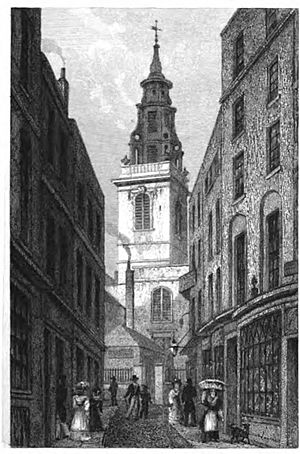St Michael, Crooked Lane facts for kids
Quick facts for kids St. Michael, Crooked Lane |
|
|---|---|
 |
|
| Location | Miles' Lane, London |
| Country | United Kingdom |
| Denomination | Church of England |
| Architecture | |
| Architect(s) | Christopher Wren |
| Style | Baroque |
| Demolished | 1831 |
St Michael, Crooked Lane was an old church in the City of London, England. It stood on the east side of Miles's Lane. After the terrible Great Fire of London, the famous architect Sir Christopher Wren rebuilt it. Sadly, the church was taken down in 1831 to make way for a new bridge.
Contents
What Happened to St Michael's?
Early Days of the Church
This church existed as far back as 1304. It started as a small building near where butchers worked in Eastcheap. In 1336, a man named John Lovekeyn, who was Lord Mayor of London four times, rebuilt it to be much bigger. Later, another Lord Mayor, Sir William Walworth, also gave money to the church.
The church was special because it belonged to the Archbishop of Canterbury. This made it one of 13 "peculiar" churches in London that were directly under his control.
The Great Plague and Rebuilding
In 1665, the first cases of the terrible Great Plague of London were found in this church's area.
After the Great Fire of London destroyed the church in 1666, Sir Christopher Wren rebuilt it. The new church was finished in 1687. It had a simple but grand design. The tower was about 100 feet tall and topped with a spire, a clock, and a weather-vane.
Why Was the Church Demolished?
In 1831, St Michael, Crooked Lane, was taken down. This happened because London Bridge was being rebuilt and needed wider roads leading to it. The church was in the way.
Its parish (the area it served) was then joined with another nearby church, St Magnus the Martyr. Today, you can see a special stained-glass window in St Magnus's church that remembers the old St Michael's parish.
Some of the memorials from the demolished church were moved to St Mark's Church, Kennington.
St Michael's in Books
The American writer Washington Irving wrote a long description of St Michael's church. He included it in his famous book The Sketch Book. Irving was looking for clues about Shakespeare's character Falstaff and heard about a picture of an old tavern in St Michael's church. Even though he didn't find it, his trip was still an interesting adventure!
 | Emma Amos |
 | Edward Mitchell Bannister |
 | Larry D. Alexander |
 | Ernie Barnes |

